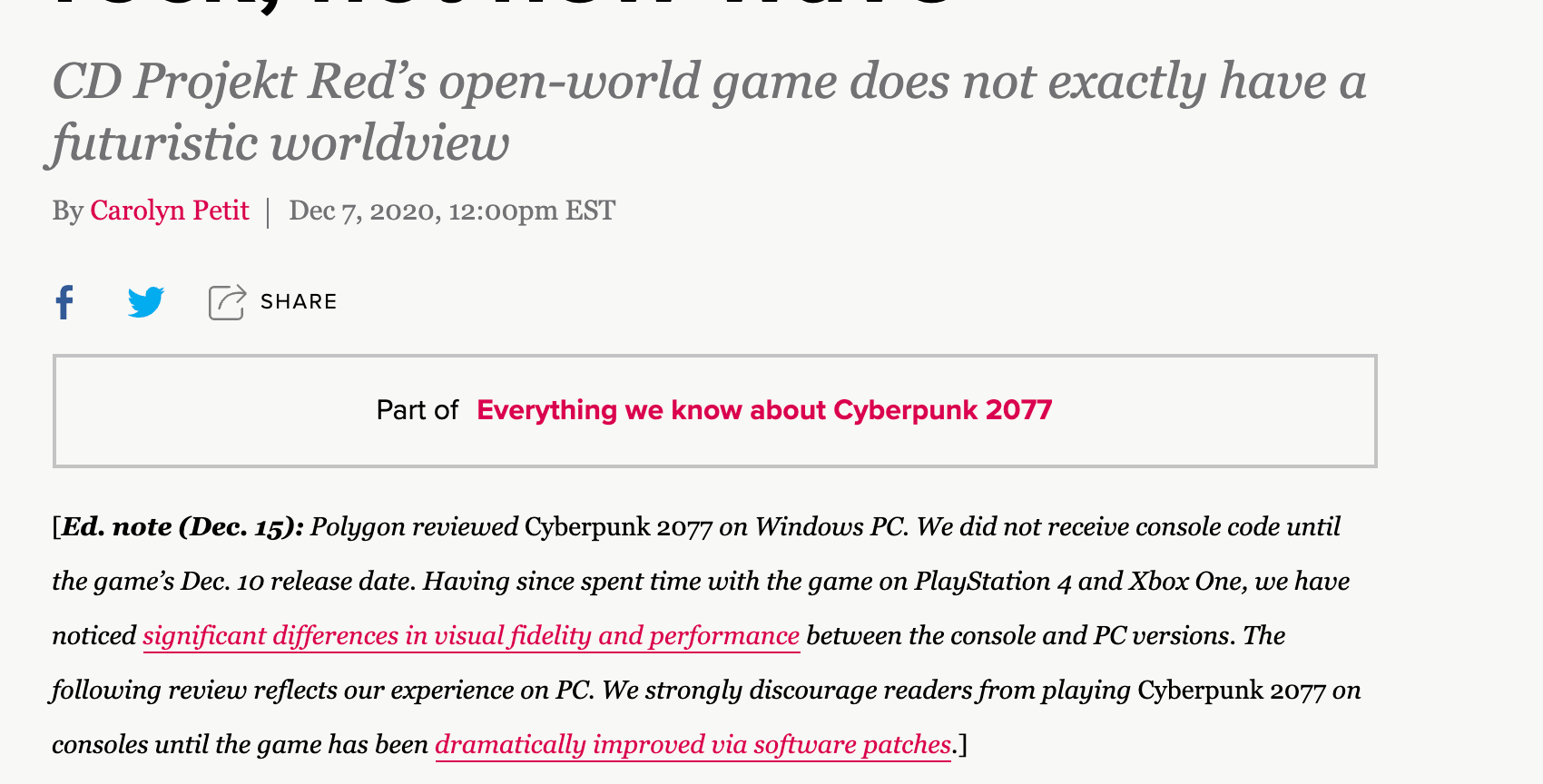I smacked my hand up last week in an embarrassing slip and fall incident and thus my ability to type was hindered, but not my ability to post, which is my duty to you the reader. However, it meant that I didn’t out anything Friday, and thus here I am, apologizing to you, the reader. Also, I’m not going to write Thursday or Friday for two weeks. Why am I apologizing? You hate me! You hate me and my words! Get out of my house before I call the law!
Cyberpunk 2078
People can’t stop talking about this game, mostly because it keeps getting worse, like corrupting your save files if they get too big, or the developer getting sued because they misled investors. Not great, Bob! I, personally, do not want to see a lawsuit brought against this company by governing authorities because of misleading statements about the game, most notably because I do not want to see a legal precedent set about games overpromising and underdelivering, because there’s no way that that doesn’t end up hurting someone who doesn’t deserve it.
Albert Burneko of Defector wrote a piece about Cyberpunk’s review situation, primarily focusing on the fact that reviewers had to sign an NDA to not post footage of the gameplay footage unless it was from CDProjekt themselves. Albert makes a point that journalists who do this are sellout cowards, which I get but fully disagree with, but also want to add a layer of intrigue to:
Why did no review that I have read literally start with a statement about having to sign that NDA, and then a length analysis about what they were trying to hide? Now, I haven’t read the NDA and there may be language in there that says you couldn’t mention it in the review, but I’d be surprised. Every single Cyberpunk review - even the ones I liked - let down any and all readers by not beginning with a paragraph about the NDA. It should have literally begun with “here are the strictures we were put under, and here is why we think we were put under them.” Polygon should be ashamed of themselves to add a note on December 15th, days after the game’s launch and over a week after their review, that this was only about the PC version.

The NDA isn’t inside-baseball - it’s like an old gumshoe being told to stay off of a lead “or else.” Except with absolutely no danger for the outlet in question. They should’ve led with it - “hey, we were told we can’t share footage. And you want to know why? Well, we’re not sure, but here are some reasons.” Or perhaps the reasons were obvious, and the outlets simply…didn’t want to rock the boat? I don’t know. It’s embarrassing to me. Burneko put it well:
In order to receive an early copy of the game, reviewers had to sign the NDA, which forbade them from showing their readers any actual video of how the game performed. The only credible read on this is that Cyberpunk 2077‘s creators knew their game would perform horribly on commonplace hardware and wanted to limit the viral spread of visual evidence until after gamers had already bought hundreds of millions of dollars’ worth of copies of the game. The logic there is not difficult to figure out: In even the most apocalyptic release scenarios, some number of people who might otherwise have been dissuaded by visual proof that the game would be a glitchy, nigh-unplayable pile of shit would, in the absence of that proof, purchase the game and then never get around to seeking a refund—or would seek one but never get further than the first corner of some retailer’s labyrinthine return policy before giving up. (You can decide for yourself whether you’d like to call this “fraud.”)
I don’t know if I’d call it fraud, but I call it diplomacy - it is simply how things have been done for years, and I am guilty of it too. You don’t wanna be too mean, right? And I think reviewers probably assumed the damning description of bugs would come through their reviews. Which is fair, but also wrong, because visual proof is very obvious.
The whole thing’s a mess and but I still enjoy reading about it. Hell, I like the game too.
The Most Boring Article That Nobody Will Shut Up About
The internet has been abuzz with discussion of Elle’s “The Journalist and the Pharma Bro,” a tale of Christie Smythe, a Bloomberg reporter who fell in love with Pharmacy Fraud and Greasy Weirdo Martin Shkreli, leaving her job and her husband for him only for him to ignore her completely when she went public with this story.
You’d think from that paragraph it would be a sordid, scandalous tale full of intrigue and quotes, full of twists and turns, and you’d especially think that based on people saying “this is a lot.” But it isn’t. I am having the anti-jealousy list reaction to the piece, and I am genuinely annoyed that people are treating it with a level of scandal and excitement that they are.
It is fucking boring and lazy.
In the writer’s hands was a completely bonkers story - a reporter from a leading business outlet well known for having sky-high standards fell for her source, she divorced her husband, she did all of these things, and yet the story itself reads like a Wikipedia entry, listing events with little emotion, detail or information. The writer barely sources anything outside of Smythe’s testimony. Take this paragraph, for example:
Smythe wasn’t covering the trial for Bloomberg (she was on book leave), but she was there in the courtroom every day, sometimes sitting with Shkreli’s supporters—friends from the Internet who’d rarely interacted with him in person until then. Once they all ate lunch with Shkreli in the court cafeteria, and they also went out for drinks a couple of times after the proceedings adjourned. Smythe says she wanted to “tunnel to, Who are his core people, who should my sources be,” and hear “backstory” from Shkreli on each day’s testimony.
Now I ain’t no Pulitzer fella, but I would have probably tried to find out who those supporters were and ask about their relationship with Smythe.
Now, as a reader who hasn’t read this, how much time would you assume was dedicated to her divorce and her resignation from her job? Would you say a lot? Or would you say 174 words? Because that’s all it got. The piece is framed about these massive events that took place as a result of her love for Shrek or whatever his name is, and this is all you get?
In summer 2018, her editor summoned her to a conference room at Bloomberg headquarters. When she arrived, her editor and an HR rep sat waiting. They’d already warned her about her tweets regarding Shkreli, which she believed she'd complied with, though she continued tweeting about him some. Now her superiors told her that behavior was biased and unprofessional. Smythe understood their concern and quit on the spot, hugging her editor on her way out of the building. "Ms. Smythe’s conduct with regard to Mr. Shkreli was not consistent with expectations for a Bloomberg journalist,” the Bloomberg spokesperson says. “It became apparent that it would be best to part ways. Ms. Smythe tendered her resignation, and we accepted it."
At home, Smythe’s stress over Shkreli and her now-uncertain work future compounded her problems with her husband. “I’m not going to say it was wrong for him to be concerned,” she says, but the fights got too sharp and too frequent. They’d been considering divorcing since the start of the year, and decided to move ahead.
No conversation with the husband, or even a “he declined to comment”? What about his friends? What about their divorce attorney? I see a quote from a friend called Alyssa Haak, who is quoted twice, giving the vaguest possible “she knew what she was getting into.”
The piece feels as if the writer assumed - based on the fact that Smythe has sold a movie deal - that a long conversation with one source would be sufficient to deliver a piece. The actual story is just…boring. It’s one of the dullest things I’ve ever read, and I read it only because people wouldn’t shut up about it. She falls for the guy because she covers him a lot, and they have some sort of weird quasi-online relationship which we get very little detail about. People are so desperate for gossip and excitement that they are projecting these deep, meaningful things - ironic, considering the subject matter - onto a story that lacks any of the detail or sauce that actually gives a story like this meaning or weight.
It feels as if the writer and the editor thought this was a bigger and more meaningful story than it actually was, and wanted to get ahead of the film version so that they could get involved somehow. There is no analysis of this awful quote - “not getting the defendant’s side” when referring to a rich, white ghoul, a truly terrible thing to leave unchallenged considering America’s deeply racist criminal justice system that classically treats rich white guys with significantly more care than people of color.
Now Smythe is rethinking the legal stories she used to write. “You’re never getting the defendant’s side,” she says. Hearing Shkreli’s perspective throughout the trial and watching his experience in prison has “changed my perspective enormously,” she says. “I start to sound like a defense lawyer when I talk now.”
There’s a lot of sympathy given to both the subject and Shkreli, to the point that it’s clear they didn’t really plumb any emotional depth. It almost feels as if they stripped away any details about their actual relationships - just that calls were made and vague subjects were discussed, that they talked about prenups and names of children, nothing that actually spoke to anything. She hasn’t seen him in a year, a thing that lots of people bring up as important, but honestly it just rings to the overall irrelevance and annoying nature of the piece - who cares? And how do we have an entire story about a person going nuts for another person, defending them on Twitter while they’re still a reporter without a single quote of the god damn tweets? Did a lawyer read this over before it was published?
Based on everyone’s excitement and quoting that Shkreli hadn’t talked to her in a year, I had assumed this was going to be a bonkers King George V style erotomania piece. Nope!
It ends with a statement that tells you everything: “I can’t gauge Shkreli’s motive, and ask Smythe what she thinks.” That’s actually the most accurate summary of the piece - a half-baked summary of someone else’s thoughts with no effort to delve deeper into anything, a collection of interview notes vaguely strung together into what approximates an article, with just enough sizzle that people will tweet quotes from it and then never think about it again.
I dunno, I think I just expect more.

